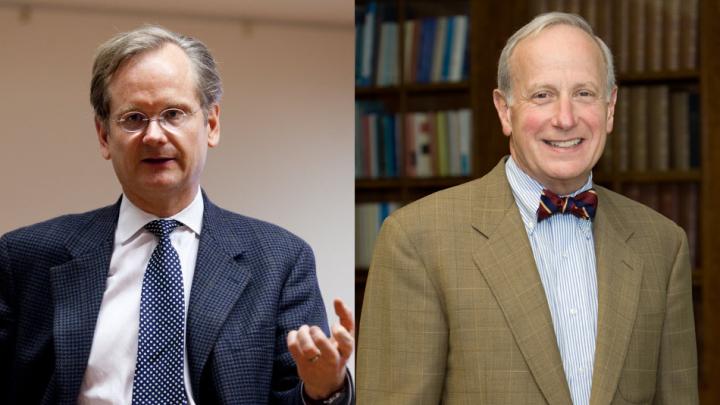Be it in Congress, business, law, medicine, journalism, or even aspects of our daily lives, personal integrity isn’t as strong as it used to be—and that needs fixing.
Such is the view of members of the College class of 1962, who expressed concerns about diminished integrity in both a class survey and a series of on-campus discussions held during Commencement week.
With hundreds of classmates gathered in Science Center Hall B, and later in Sanders Theatre, Hill professor of business administration Malcolm Salter ’62 opened the discussions by stating that their purpose was “not merely to wring our hands. What we seek is clarification and suggestions for reform. Maybe our best responses to compromised integrity will not emerge today, but certainly they can and will tomorrow. So, in this spirit, the [class reunion] committee sees today’s dialogue as an optimistic exercise.”
Salter then introduced Furman professor of law and leadership Lawrence Lessig, director of the Edmond J. Safra Center for Ethics. Lessig is overseeing a five-year project addressing questions of “institutional corruption” that weaken the effectiveness of institutions or weaken public trust. He presented an engaging multimedia slideshow, “Republic Lost…And What to Do About It,” which (like his recent book Republic, Lost: How Money Corrupts Congress—and a Plan to Stop It) described how money corrupts American politics, and his work in devising a roadmap for reform.
“People say, ‘Why are you so interested in talking about so many institutions, why not just stick with one?” Lessig asked. “I think the point is that it becomes easier to see institutional corruption when you look out across the different institutions—these different republics. You’ll never see it about your own institution, but you’ll always see it about other institutions. We all see it about Congress. The point is, you can recognize it by looking at it elsewhere….Salience is an important conception of responsibility.”
Subsequent panels, including “Compromised Integrity in the Professions, and What to Do About It” and “Why We’re Not as Ethical As We Think We Are,” drew on experts such as former Manhattan borough president Ruth Messinger, former acting New York State Supreme Court Justice Leslie Crocker Snyder, former Washington Post editor/writer and former president of National Public Radio Kevin Klose, and Dr. Peter Schwartz, professor of clinical obstetrics at Drexel University. Among the questions they pondered: “How have integrity and ethics been compromised by the choices that professionals…make in their everyday and long-term decisionmaking? Where have professionals ended up participating in corrupt, unethical activities, despite clear professional standards to the contrary?”
Snyder spoke of the compromised ethics of judges, specifically the notion that judges are supposed to be above politics, yet many are “mired in political ideology.”
“We have seen certain judges in our highest court involved in accepting free boondoggles by known conservative billionaires who have these boondoggles in order to advance their agenda,” Synder said. “They sit on cases such as Citizens United, so the decision can’t be that surprising to us.”
The panelists for “Compromised Integrity in Business and Government and What to Do About It” included former Morgan Stanley CEO Archibald Cox Jr., U.S. Representative Thomas Petri (R-Wisconsin), and former Brooklyn district attorney and U.S. Representative (D-New York) Elizabeth Holtzman. Contemplating the decline in public trust in our government and business institutions, and drawing on their own experiences in business and government, they addressed the financial crisis of 2008, corrupt banking regulations, and controversial issues surrounding nutrition, food, and agriculture, specifically the Farm Bill, which is amended every five years to set policies govering a broad array of programs, from crop support to conservation and from food assistance to forestry.
“In the past five years, investment in food commodities has gone up from $65 billion a year to $126 billion, pushing prices up and causing price inflations that are completely unrelated to the supply of food,” said panelist Nora Katherine McKeon ’62, a former member of the United Nations Food and Agricultural Organization, and now a writer and activist. The current Farm Bill, she said, discourages diversified farming and sustainable food practices and encourages large industries and corporations that rely on using high fructose corn syrup which has been shown to increase both obesity and Type II diabetes.
“There is a lot of good lobbying going on out there,” McKeon said, adding: “but the corporation lobbies are hard to beat.”









